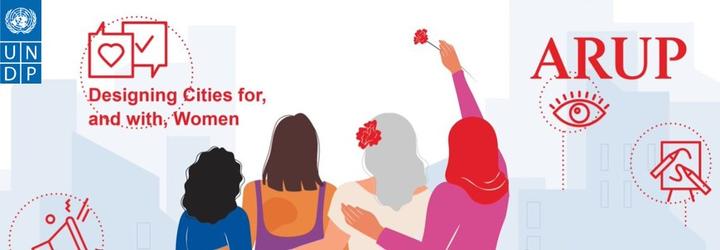The report provides actionable recommendations and guidance for policy-makers, urban and development practitioners on how to design and plan for cities that are safer, healthier, fairer and more enriching for women and girls.
Cities Alive: Designing cities that work for women
Webinar by UNDP, Arup, and the University of Liverpool held on 24 October 2022
Cities provide pivotal hubs of innovation, productivity, and opportunities, and importantly homes and communities, and are a melting pot of individuals and cultures. However, when planned without social equity and diversity, they widen social gaps.
In cities across the world, women of all ages and gender identities face a range of barriers and vulnerabilities. These include gender-based discrimination, inequality, violence, poverty, unpaid care work, limited control over assets, and unequal participation in private and public decision-making. Billions of women who reside in urban areas are underserved by the environments they live and work in. In both subtle and overtly discriminatory ways, cities are often built in such a way that women are unsafe, their basic needs are not met, and that their social and economic opportunities are restricted.
Join the global launch of the new publication “Cities Alive: Designing Cities that Work for Women.” Developed by Arup, UNDP, and the University of Liverpool, the report presents fresh takes on how to achieve gender equity in the built environment benefits all communities globally. It provides actionable recommendations and guidance for policy-makers, and urban development practitioners on how to design and plan for cities that are safer, healthier, fairer and more enriching for women and girls.
The report also offers real-world case studies and an easy-to-follow methodology to directly engage women in urban decision-making processes and incorporate their needs, concerns, and ideas in the planning, design and construction of gender-inclusive cities.
This high-level event and the global launch of the new publication will feature prominent speakers from UNDP, ARUP, the University of Liverpool, civil society, and the private sector.
Speakers include:
- Francine Pickup, Deputy Director, UNDP Bureau for Policy and Programme Support
- Sara Candiracci, Associate Director and Lead for Inclusive and Resilient Cities, Arup
- Kim Power, Principal Planner, Arup
- Abdallah al Dardari, UNDP Resident Representative in Afghanistan
- Sowmya Parthasarathy, Director and Lead for Urban Design and Master Planning, Arup
- Léan Doody, Director and Lead for Cities, Planning, and Design in Europe Programme, Arup
- Martyn Evans, Creative Director, U and I Group PLC
- Catherine Queen, Lecturer in Planning, University of Liverpool
- Smruti Jukur Johari, Urban Planner, School For Potential Advancement And Restoration Of Confidence (SPARC) India and Slum Dwellers International (SDI)
Retrieved from https://www.youtube.com/watch?v=QMCEn4e4AYw
